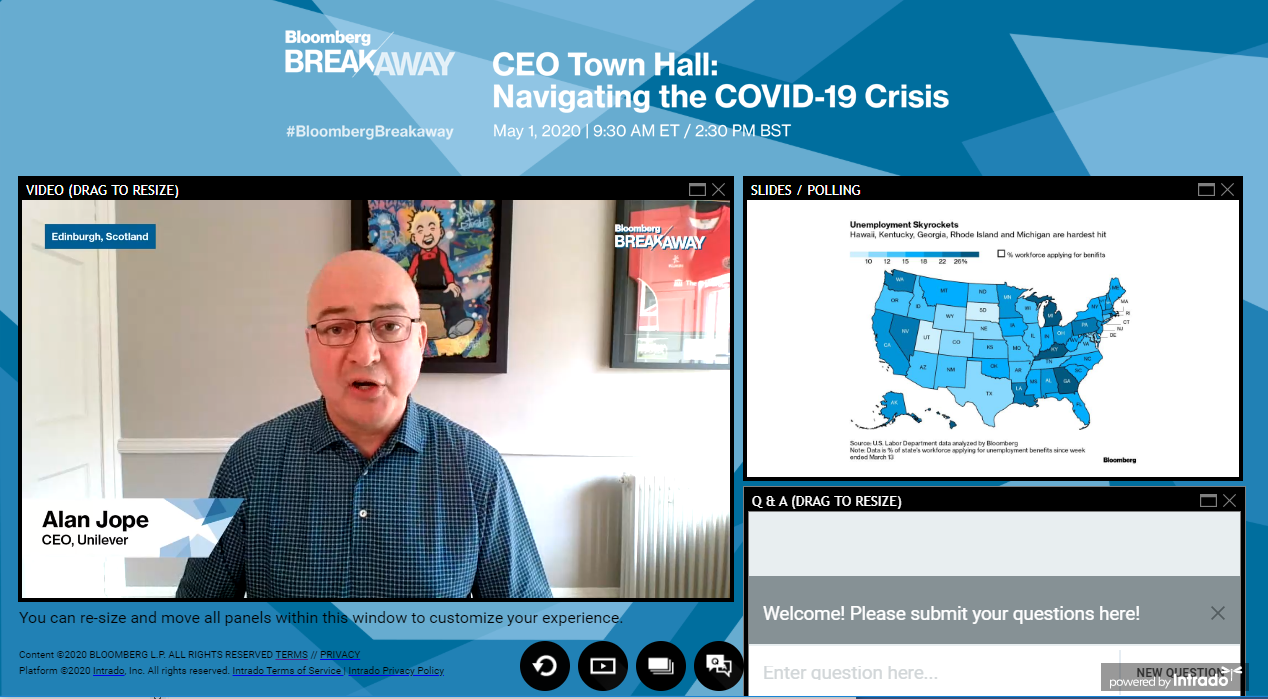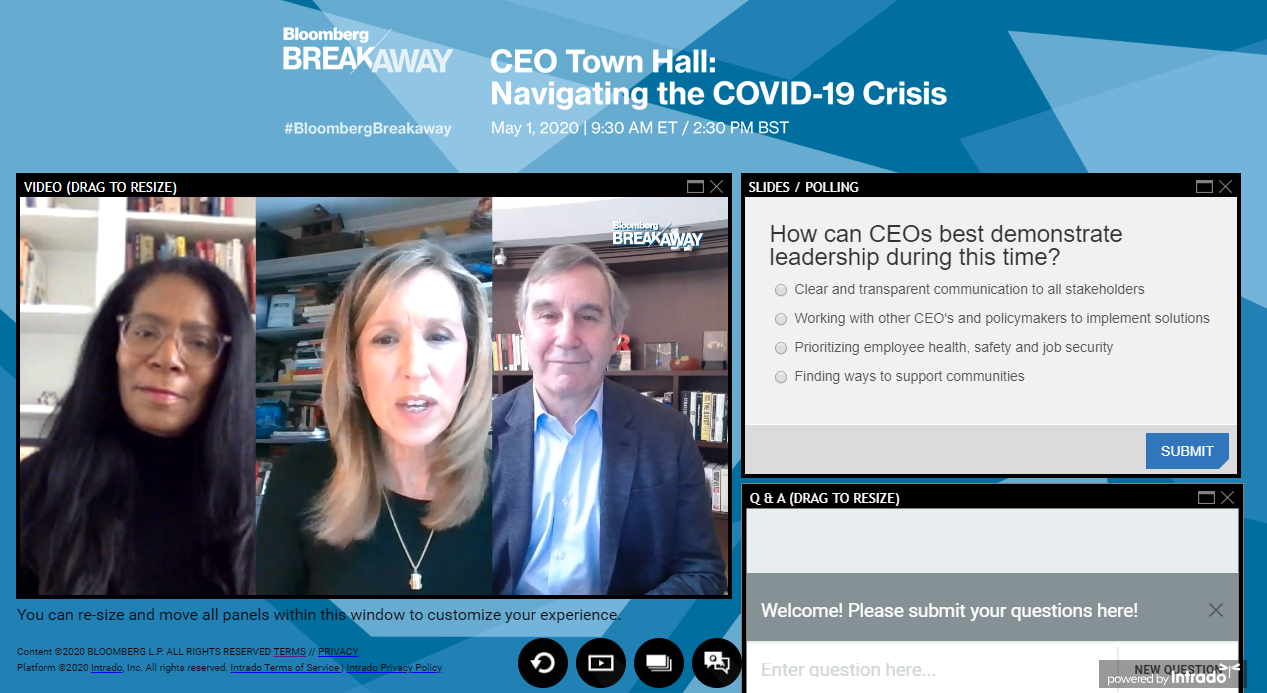Today we launched our virtual Bloomberg Breakaway series to discuss how CEOs are steering their companies through the COVID-19 pandemic, and their leadership advice for peers and clients at this time.
Bloomberg’s Carol Massar spoke with Alan Jope, CEO of Unilever, Richard Edelman, President & CEO of Edelman, and Judy A. Smith, Founder and President of Smith & Company (the inspiration behind the hit TV series “Scandal”).
In case you missed it, below are some key insights from our conversation, but you can also view the entire event here.

Unilever’s Pandemic Performance Trends
- Healthcare, technology and consumer staples are areas where stocks have done well during this crisis. “We’re lucky,” Jope said, “to be in these sectors where consumer demand continues. We have financial strength in the balance sheet and we have wonderful staff, which mean means we’ll come through this.”
People at the Heart of the Crisis
- Unilever has 150,000 people on the payroll. Jope expects to protect all jobs in the long-term and doesn’t want government funds to subsidize temporary layoffs. He stated that such schemes are “not designed for companies like us.”
- According to Jope, Unilever factories can be the safest places for people to be at this time given strict hygiene processes, PPE availability and social distancing rules in place. Jope went on to say that there is no shortage of PPE globally; you can get as much as you need so long as you take an international approach to sourcing.
Marrying Profit with Purpose
Unilever is guided by the mantra that brands with purpose grow and last and that people with purpose thrive. Climate change and inequality are not going away — when we start to rebuild after this pandemic, we cannot take our eye off these issues. They will haunt us if we don’t deal with them quickly and young people will feel let down.
- Unilever is prioritizing gender inequality. Its non-executive and management committees are a 50/50 gender split, but now the company wants to extend more opportunities to women and to deal with income inequality. “After all,” said Jope, “the only step changes in economic inequality tend to happen after wars or crises.”
- “We fear a retreat to nationalism,” Jope said. Collaboration is required to fight key global issues including climate change. “If we see countries restrict materials to their borders then we risk abandoning all progress made through multilateralism in the last few decades,” Jope went on to say.
On reflection, Jope says he is pleased to have put Unilever’s people first in this crisis. He wants to build agility and responsiveness into Unilever by letting people close to the front line of markets exercise their judgement and decision-making. Jope went on to say that the business had discovered a new responsiveness during this time that he wished had been unleashed years ago – it has taken this crisis to do that.

CEO Responses to the COVID-19 Crisis
Richard Edelman said that up to this point, businesses have been in the passenger seat letting governments drive the car. “CEOs have to stand and speak up now,” he said. “There hasn’t been a single op-ed from a major CEO in the last 3 weeks, and they need to show public leadership on what the new normal is going to be.”
Judy Smith agreed, stating that CEO visibility is essential. “What they can do on a broader basis to assist during this pandemic will help to define their company and personal brands,” she said.
Smith went on to say that it is critical for CEOs to outline with clarity the structures, tools and safety measures that are in place for employees who are on the front lines of business. This is especially pertinent in light of a recent survey Smith referenced that showed 55% of employees are afraid or concerned about returning to work.
Brand Positioning and Communication
Edelman said that businesses now have to be about solutions and not about selling. 90% of consumers expect brands to talk to them frequently and they should speak up as critical sources of information. The biggest challenge right now is misinformation; people spread false information all the time and you need to be quick to respond, he said.
Smith stated that, “Good communication is about consistent and accurate information… you can’t overdo it on critical information. You have to run your business in a way that is consistent with your values.”
What will the New Normal Look and Feel Like?
Edelman said that his company would be looking to pivot to the following measures for employees after a return to work:
- Flexible working hours,
- Set protocol for coffee machine usage
- Wearing of masks and gloves
- No more than 5 people in a meeting
- No international travel initially
- Set protocol for calling on clients such as temperature checks.
- Encouraging workers who feel unwell to take as many days off as needed
- A review of how much work and office space will be needed going forward
“I miss the camaraderie and collaboration of human meetings and conferences,” Edelman said. “Having a beer on Zoom works if you know somebody but it’s not so good when it comes to making new connections.”
Dealing with the Second Wave
According to Edelman, a second wave is more than likely to happen and you don’t want businesses to be blamed, but rather to be ready for it. It’s therefore critical that businesses have a protocol in place and react very quickly to an outbreak by following public health guidance and being part of the solution.
According to Smith, businesses are waiting for the second wave to come and pass. “Most companies we talk to are waiting it out and not allowing more than 10% of their work force to go back to the office,” she said.
The key question Smith posed is this: “What should we be prepared for that we aren’t prepared for now and how do we pivot to the future?”
——————————
Join the Conversation: #BloombergBreakaway
Instagram: @BloombergLive
LinkedIn: Bloomberg Live
Twitter: @BloombergLive
Interested in more Bloomberg Live virtual events? Sign up here to get alerts.
——————————